Another Bubble in Stocks and Housing?
Stock-Markets / Financial Markets 2010 Apr 24, 2010 - 09:37 AM GMT Compare the U.S. Census Report… “New orders for manufactured durable goods in March decreased $2.2 billion or 1.3 percent to $176.7 billion, the U.S. Census Bureau announced today. This decrease followed three consecutive monthly increases, including a 1.1 percent February increase. Excluding transportation, new orders increased 2.8 percent. Excluding defense, new orders decreased 1.2 percent.”
Compare the U.S. Census Report… “New orders for manufactured durable goods in March decreased $2.2 billion or 1.3 percent to $176.7 billion, the U.S. Census Bureau announced today. This decrease followed three consecutive monthly increases, including a 1.1 percent February increase. Excluding transportation, new orders increased 2.8 percent. Excluding defense, new orders decreased 1.2 percent.”
To the Bloomberg news article…“Orders for durable goods excluding transportation surged in March by the most since the recession began in December 2007, adding to evidence the U.S. recovery is broadening and strengthening.
The 2.8 percent increase in bookings for goods meant to last at least three years, excluding cars and aircraft, was four times larger than the median forecast of economists surveyed by Bloomberg News, figures from the Commerce Department showed today in Washington. Total orders unexpectedly dropped 1.3 percent, depressed by a 67 percent plunge in demand for commercial aircraft that is often volatile.” It’s all in the spin.
Dodd Bill Would Allow Fed To Hide Its Spending.
The Wall Street reform bill headed for a test vote on the Senate floor Monday night will allow the Federal Reserve to continue to pump trillions of dollars into major banks largely in secrecy, the co-author of House language that would open the central bank to an audit charged in a memo to the Senate.
"The Senate has a provision in its reform bill that purports to audit the Fed. But, it really doesn't do anything of the sort. I'm going to run down the details for you, and reprint the legislative language so you can read it yourself," writes Rep. Alan Grayson (D-Fla.).
The incredible world of government interference.
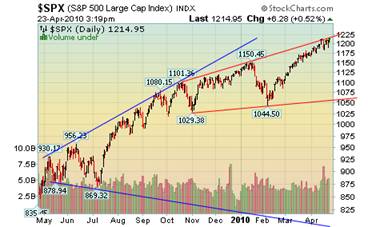 -- American Banking News opines: It’s incredible to me to see the U.S. government take taxpayer money, use it absolutely to not allow this giant bank to fail, then turn around after bailing it out and putting a huge portion of what Citigroup owes them in common shares of the company, then manipulating their position in the company in an effort to inflate the share price of Citigroup in order to make a huge profit. If this was being done by a private company I wonder if there would be any screaming and hollering over what was being done? I wonder if there would be any investigations?
-- American Banking News opines: It’s incredible to me to see the U.S. government take taxpayer money, use it absolutely to not allow this giant bank to fail, then turn around after bailing it out and putting a huge portion of what Citigroup owes them in common shares of the company, then manipulating their position in the company in an effort to inflate the share price of Citigroup in order to make a huge profit. If this was being done by a private company I wonder if there would be any screaming and hollering over what was being done? I wonder if there would be any investigations?
The rally in Treasury bonds doesn’t last.
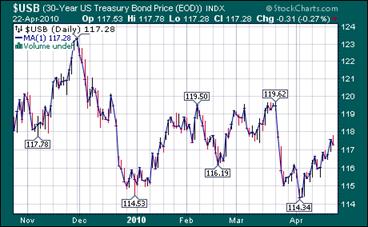 --Treasuries headed for a weekly loss, snapping two weeks of gains, as signs the economy is improving and the government’s plans to sell a record amount of debt overshadowed concern Greece will default. Two-year notes were poised for the biggest weekly decline this month before government reports that economists said will show bookings for durable goods rose for a fourth month and new home sales ended four months of declines. The Treasury will sell a record $129 billion in notes next week, with the auctions to be held on four consecutive days beginning April 26.
--Treasuries headed for a weekly loss, snapping two weeks of gains, as signs the economy is improving and the government’s plans to sell a record amount of debt overshadowed concern Greece will default. Two-year notes were poised for the biggest weekly decline this month before government reports that economists said will show bookings for durable goods rose for a fourth month and new home sales ended four months of declines. The Treasury will sell a record $129 billion in notes next week, with the auctions to be held on four consecutive days beginning April 26.
Gold rises, but will it last?
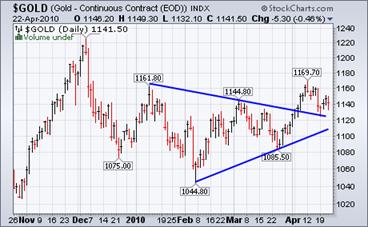 -- Gold rose the most in two weeks after the dollar halted a six-session rally against the euro, boosting the appeal of the precious metal as an alternative investment. The euro rebounded from the lowest level in almost a year after Greece asked for a bailout from the European Union and the International Monetary Fund, easing concern that mounting debt will erode the value of the 16-nation currency.
-- Gold rose the most in two weeks after the dollar halted a six-session rally against the euro, boosting the appeal of the precious metal as an alternative investment. The euro rebounded from the lowest level in almost a year after Greece asked for a bailout from the European Union and the International Monetary Fund, easing concern that mounting debt will erode the value of the 16-nation currency.
Nikkei retreats even more.
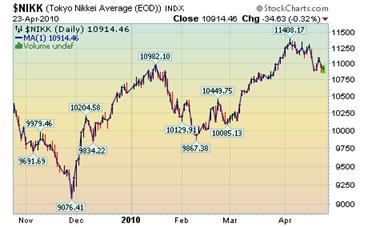 -- Japanese stocks fell, capping its biggest weekly retreat in almost three months, on concern swelling government debt will derail the global economic recovery. The Nikkei 225 fell 0.3 percent to close at 10,914.46 in Tokyo. The broader Topix index was little changed at 978.20, with almost twice as many shares rising as declining. Fitch Ratings said yesterday that Japan’s swelling debt may put “downward pressure” on the nation’s sovereign AA-rating.
-- Japanese stocks fell, capping its biggest weekly retreat in almost three months, on concern swelling government debt will derail the global economic recovery. The Nikkei 225 fell 0.3 percent to close at 10,914.46 in Tokyo. The broader Topix index was little changed at 978.20, with almost twice as many shares rising as declining. Fitch Ratings said yesterday that Japan’s swelling debt may put “downward pressure” on the nation’s sovereign AA-rating.
China wants to tax third houses.
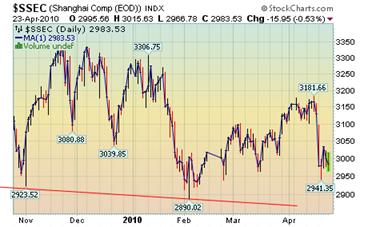 -- China stocks fell, sending the benchmark index to its biggest weekly decline in five months, as retailers and automakers slid on concern government measures to curb the property market will reduce spending. The Chinese government is considering property taxes on third homes owned by individuals. This is thought to put a damper on other consumer goods associated with home ownership.
-- China stocks fell, sending the benchmark index to its biggest weekly decline in five months, as retailers and automakers slid on concern government measures to curb the property market will reduce spending. The Chinese government is considering property taxes on third homes owned by individuals. This is thought to put a damper on other consumer goods associated with home ownership.
The U.S. Dollar continues its rally.
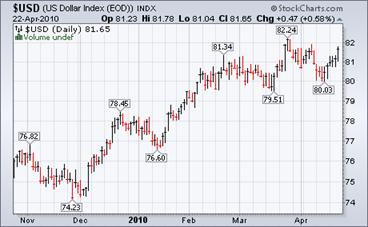 -- The dollar pulled back today, still ending higher for the week. The reason given for the dollar rally is not so much that our economy is so strong, but the Euro and the Yen are so weak. There is currently more concern over Germany dropping its ties with the European Union than with the Greek bond implosion. That would cripple the value of the Euro and leave the EU hobbled financially and unable to deal with its own problems.
-- The dollar pulled back today, still ending higher for the week. The reason given for the dollar rally is not so much that our economy is so strong, but the Euro and the Yen are so weak. There is currently more concern over Germany dropping its ties with the European Union than with the Greek bond implosion. That would cripple the value of the Euro and leave the EU hobbled financially and unable to deal with its own problems.
Schiller concerned about another “mini-bubble” in stocks and housing.
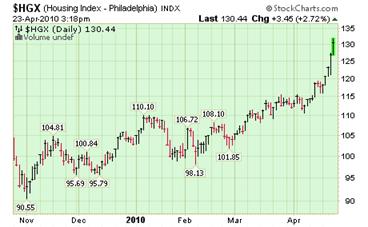 -- Robert Shiller: Home prices have been going up for nearly a year now, according to our data, the S&P/Case-Shiller indices ... Normally we could extrapolate that kind of upward trend because historically home prices have shown a lot of momentum. But I think we're in a very unusual circumstance because of the massive bailouts, the homebuyer tax credits, the Fed's purchase of mortgage-backed securities -- and these things are coming to an end. So it's an unusual period. So I don't trust the trend that we have. I'm worried that it might get reversed.
-- Robert Shiller: Home prices have been going up for nearly a year now, according to our data, the S&P/Case-Shiller indices ... Normally we could extrapolate that kind of upward trend because historically home prices have shown a lot of momentum. But I think we're in a very unusual circumstance because of the massive bailouts, the homebuyer tax credits, the Fed's purchase of mortgage-backed securities -- and these things are coming to an end. So it's an unusual period. So I don't trust the trend that we have. I'm worried that it might get reversed.
Biodiesel still garnering interest.
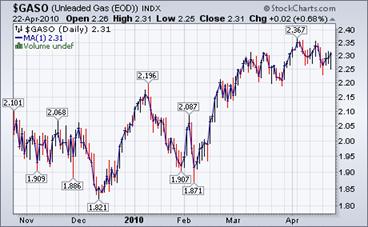 The Energy Information Agency weekly report observes, “Biodiesel is a renewable fuel derived from animal and vegetable oils, including waste oils, used in diesel engines. The idea of using vegetable-oil-derived fuels to power diesel engines is not new – in fact, it can be traced back to 1897, the year Rudolf Diesel invented the engine that bears his name. Interest has surged in recent years as concerns over the environment and national security have produced policies in the United States and other countries that encourage use of renewable fuels for transportation.”
The Energy Information Agency weekly report observes, “Biodiesel is a renewable fuel derived from animal and vegetable oils, including waste oils, used in diesel engines. The idea of using vegetable-oil-derived fuels to power diesel engines is not new – in fact, it can be traced back to 1897, the year Rudolf Diesel invented the engine that bears his name. Interest has surged in recent years as concerns over the environment and national security have produced policies in the United States and other countries that encourage use of renewable fuels for transportation.”
Natural Gas prices follow lower consumption.
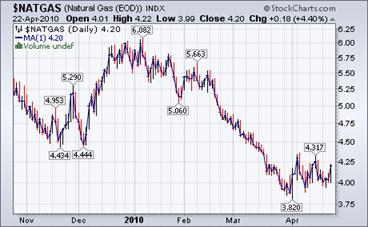 --The Energy Information Agency’s Natural Gas Weekly Update reports, “Prices fell at all market trading locations in the lower 48 States during the week, with declines averaging around 20 cents per MMBtu, reversing gains that occurred at most market locations last week. The Henry Hub spot price fell 19 cents, or about 5 percent.” Commercial and residential consumption was up .6%, while industrial use was down .5%.
--The Energy Information Agency’s Natural Gas Weekly Update reports, “Prices fell at all market trading locations in the lower 48 States during the week, with declines averaging around 20 cents per MMBtu, reversing gains that occurred at most market locations last week. The Henry Hub spot price fell 19 cents, or about 5 percent.” Commercial and residential consumption was up .6%, while industrial use was down .5%.
The best financial reform? Let the bankers fail.
The trouble with Wall Street isn't that too many bankers get rich in the booms. The trouble, rather, is that too few get poor -- really, suitably poor -- in the busts. To the titans of finance go the upside. To we the people, nowadays, goes the downside. How much better it would be if the bankers took the losses just as they do the profits.
Happily, there's a ready-made and time-tested solution. Let the senior financiers keep their salaries and bonuses, and let them do with their banks what they will. If, however, their bank fails, let the bankers themselves fail. Let the value of their houses, cars, yachts, paintings, etc. be assigned to the firm's creditors.
We cannot afford (Goldman Sachs to do) God’s work anymore.
The US Senate this week will debate Chris Dodd’s bank reform proposals. Folded into the bill that is supposed to come out of the debate, will be a separate bill on derivatives. Which, just off the press, apparently was voted in by the Senate Agriculture Committee. Who else? You thought the Banking, Housing, and Urban Affairs or Economic Policy or Financial Institutions or Securities, Insurance, and Investment committees might have been more appropriate? You’re so new school. In the US, that's not how they do things.
Traders alert: The Practical Investor is currently offering the daily Inner Circle Newsletter to new subscribers. Contact us at tpi@thepracticalinvestor.com for a free sample newsletter and subscription information.
Our Investment Advisor Registration is on the Web
We are in the process of updating our website at www.thepracticalinvestor.com to have more information on our services. Log on and click on Advisor Registration to get more details.
If you are a client or wish to become one, please make an appointment to discuss our investment strategies by calling Connie or Tony at (517) 699-1554, ext 10 or 11. Or e-mail us at tpi@thepracticalinvestor.com .
Anthony M. Cherniawski,
President and CIO
http://www.thepracticalinvestor.com
As a State Registered Investment Advisor, The Practical Investor (TPI) manages private client investment portfolios using a proprietary investment strategy created by Chief Investment Officer Tony Cherniawski. Throughout 2000-01, when many investors felt the pain of double digit market losses, TPI successfully navigated the choppy investment waters, creating a profit for our private investment clients. With a focus on preserving assets and capitalizing on opportunities, TPI clients benefited greatly from the TPI strategies, allowing them to stay on track with their life goals
Disclaimer: The content in this article is written for educational and informational purposes only. There is no offer or recommendation to buy or sell any security and no information contained here should be interpreted or construed as investment advice. Do you own due diligence as the information in this article is the opinion of Anthony M. Cherniawski and subject to change without notice.
Anthony M. Cherniawski Archive |
© 2005-2022 http://www.MarketOracle.co.uk - The Market Oracle is a FREE Daily Financial Markets Analysis & Forecasting online publication.



